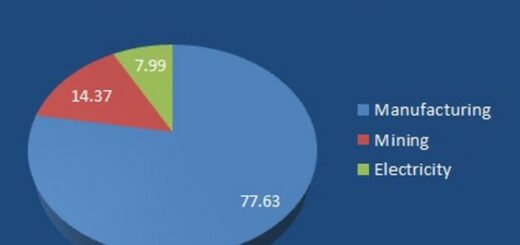National Current Affairs – UPSC/KAS Exams- 22nd January 2020
Topic: Economy
In News: The International Monetary Fund (IMF) recently projected that the global growth is to rise from an estimated 2.9% in 2019 to 3.3% in 2020 and 3.4% for 2021.
More on the Topic:
- The progress in global growth for 2020 remains highly uncertain as it relies on improved growth outcomes for stressed economies like Argentina, Iran, and Turkey and for underperforming emerging and developing economies such as Brazil, India, and Mexico.
- However, there are preliminary signs that the decline in manufacturing and trade may be bottoming out.
- This is partly owing to improvement in the auto sector and diminished fears of a no-deal Brexit. (A no-deal Brexit means the UK would leave the European Union (EU) and there would be no agreements in place about what the relationship between the UK and the EU will be like in the future.)
- Also, a US-China Phase I deal (to ease tensions related to trade between the two nations), if durable, is expected to reduce the cumulative negative impact of trade tensions on global GDP by end 2020-from 0.8% to 0.5%.
- Collective growth in the 19 countries that use the euro currency is expected to gradually pick up from 1.2% in 2019 to 1.3% in 2020 and 1.4% in 2021.
India Related Projections:
- For 2019, IMF revised downward its forecast for India to 4.8% from its October projection of 6.1%.
- For the year 2020, a 1.2% point cut in India’s growth forecast to 8%. This is the biggest downward revision for any emerging market, which also pulled down global growth forecast.
- The reasons cited for lowering growth estimate include stress in the non-bank financial sector and weak rural income growth.
- The growth will improve in 2020 owing to monetary and fiscal stimulus as well as subdued oil prices.
Source: Hindu
Global Investment Trend Monitor Report
Topic: Reports and Indices
In News: India was among the top 10 recipients of Foreign Direct Investments (FDI) in 2019 as per Global Investment Trend Monitor Report by the United Nations Conference on Trade and Development (UNCTAD).
More on the Topic:
- The global FDI marked a decline by 1% from revised $1.41 trillion ( in 2018) to $1.39 trillion (in 2019). This was against the backdrop of weaker macroeconomic performance and policy uncertainty for investors in the midst of ongoing trade tensions.
- Developing economies continued to attract more than half of global FDI flows, whereas, the FDI flows to developed countries decreased further by 6%.
- Despite this, the United States remained the largest recipient of FDI, followed by China and Singapore.
- South Asia recorded a 10% increase in FDI and this growth was driven by India marking a 16% increase in FDI inflows.
- India attracted $49 billion FDI inflows in 2019 as compared to $42 billion (in 2018). The majority of this went into services industries, including Information Technology.
- Inflows into Bangladesh and Pakistan declined by 6% and 20%, respectively.
Future Ahead:
- UNCTAD expects FDI flows to rise moderately in 2020, as according to current projections, the global economy is set to improve from its weakest performance since the global financial crisis in 2009.
- The GDP growth, gross fixed capital formation and trade are projected to rise, at the global level (especially in many large emerging markets).
- Such an improvement in macroeconomic conditions could prompt Multinational Enterprises (MNEs) to resume investments in productive assets (provided their easy access to cheap money).
- However, significant risks persist, including high debt accumulation among emerging and developing economies, geopolitical risks and concerns about a further shift towards protectionist policies.
Source: Hindu
RBI New transparency initiative
Topic: Economy
In News: The Reserve Bank of India (RBI) has released the minutes of the 579th meeting of Central Board of Directors for the first time as part of the central bank’s transparency initiative.
More on the Topic:
- The minutes of the meetings of the Central Board will be uploaded on the RBI’s website under provisions of Section 4 of the Right to Information (RTI) Act.
- Section 4 of the RTI Act requires suo motu disclosure of information by each public authority.
- So far, the regulator only shared the minutes of board meetings in response to queries under the RTI Act.
- In future, the minutes will be placed on the RBI website within two weeks from the date of its confirmation in the next meeting of the Central Board and on being signed by the chairman in the same meeting.
- New initiative will enhance public awareness about the functioning of the RBI.
Source: Hindu
Topic: International Affairs
In News: The Ministry of Law and Justice issued an Extraordinary Gazette Notification, declaring the United Arab Emirates to be a “reciprocating territory” under Section 44A of the Civil Procedure Code, 1908.
More on the Topic:
- Apart from UAE, the other countries declared to be “reciprocating territories” are: United Kingdom, Singapore, Bangladesh, Malaysia, Trinidad & Tobago, New Zealand, the Cook Islands (including Niue) and the Trust Territories of Western Samoa, Hong Kong, Papua New Guinea, Fiji, Aden.
What is a ‘reciprocating territory’ and what are superior courts?
- Essentially, orders passed by certain designated courts from a ‘reciprocating territory’ can be implemented in India, by filing a copy of the decree concerned in a District Court here.
- The courts so designated are called ‘superior Courts’.
- The scope of the Section is restricted to decrees for payment of money, not being sums payable “in respect of taxes or other charges of a like nature or in respect of a fine or other penalty”.
- It also cannot be based on an arbitration award, even if such an award is enforceable as a decree or judgment.
Significance:
- The decision is believed to help bring down the time required for executing decrees between the two countries.
- Indian expatriates in the UAE would no longer be able to seek safe haven in their home country if they are convicted in a civil case in the UAE.
Source: Hindu
Disqualification Power of Speakers
Topic: Polity and Governance
In News: The Supreme Court asked Parliament to amend the Constitution to strip Legislative Assembly Speakers of their exclusive power to decide whether legislators should be disqualified or not under the anti-defection law.
More on the Topic:
- An independent tribunal ought to be appointed instead to determine the fate of an MP or an MLA who has switched sides for money and power.
- Speaker, who is a member of a particular political party and an insider in the House, acting as the “sole and final arbiter” in the disqualification of a political defector can lead to conflict of interest.
- In the Karnataka MLAs’ disqualification case, the court had held that a Speaker who cannot stay aloof from the pressures and wishes of his political party does not deserve to occupy his chair.
- This judgment of November 2019, also urged Parliament to “reconsider strengthening certain aspects of the Tenth Schedule, so that such undemocratic practices are discouraged”.
Way Ahead:
- Disqualification petitions under the Tenth Schedule should be adjudicated by a mechanism outside Parliament or the Legislative Assemblies.
- The court suggested a permanent tribunal headed by a retired Supreme Court judge or a former High Court Chief Justice.
- Only swift and impartial disqualification of defectors would give “real teeth” to the Tenth Schedule.
- Anti-Defection Law is contained in the Tenth Schedule of the Constitution, which was introduced by the 52nd Amendment in 1985.
Source: Hindu
Topic: Science and Technology
In News: India, a partner in the construction of Thirty Metre Telescope, one of the largest telescopes in the world, has said it wants the project to be moved out of the proposed site at Mauna Kea, a dormant volcano in Hawaii.
More on the Topic:
- The TMT or Thirty Metre Telescope, as it is called, is a joint venture (JV) involving five countries, but the $2 billion project has been marred by protests for over a decade. The proposed site is considered sacred to indigenous Hawaiians, and also has too many observatories for one more such massive establishment to come up.
- The next best site to locate the telescope is the Observatorio del Roque de los Muchachos (ORM) on La Palma in the Canary Islands, Spain.
- Canada, the United States, China and Japan are the other and more significant — partners in terms of the monetary and infrastructural aspects of the TMT.
- The TMT will enable scientists to study fainter objects far away from us in the universe, which gives information about early stages of evolution of the universe.
- Also, it will give finer details of not-so-far-away objects like undiscovered planets and other objects in the Solar System and planets around other stars.
Source: Hindu
Topic: Science and Technology
In News: Atal Innovation Mission (AIM) NITI Aayog and United Nations Development Programme (UNDP) will hosts Youth Co:Lab.
More on the Topic:
- It aims at fostering technology, promoting youth leadership and social entrepreneurship in India.
- It is co-created in 2017 by the United Nations Development Programme (UNDP) and the Citi Foundation.
- It aims to establish a common agenda for Asia-Pacific countries to invest in and empower youth to accelerate implementation of the Sustainable Development Goals (SDGs) through leadership, social innovation and entrepreneurship.
- By developing 21st century skills, catalyzing and sustaining youth-led start-ups and social enterprises across the region, Youth Co:Lab is positioning young people front and center in order to solve the region’s most pressing challenges.
Source: Hindu

















